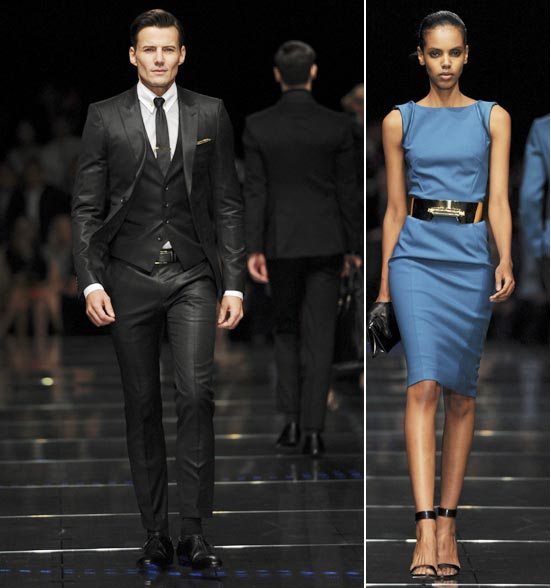Quick couture
 |
|
The online instant- purchase promotion of Hugo Boss in China features two limited-edition pieces, one for men and one for women. Photos provided to China Daily |
By offering limited editions online right after a fashion show, one luxury label tests the potential - and the limits - of instant gratification, Gan Tian reports.
New digital technologies are breaking down old barriers of time and space in the traditional luxury market. Claus-Dietrich Lahrs, chairman and global CEO of luxury house Hugo Boss, was in China recently to explain the high-tech approach used in the brand's annual big show in Shanghai at the end of May.
It usually takes time for a product in a fashion show to enter the real market. But at the Shanghai show, some Boss garments could be purchased instantly via the Internet.
When the German-based couture label put on a show last year in Beijing, it spent big bucks to live-stream the whole process in 3-D effect on its website and Sina Weibo and other online platforms for consumers who could not attend in person.
This May, Hugo Boss added something more: If you love certain items worn by a model during the show, you could just click and order right away.
It was a special promotion for two (limited-edition) pieces, one for men and one for women. "This is a new step to make the product available instantly," Lahrs says. Usually, it takes six months for a show's products to become "real" clothes that consumers can buy and wear.
Fashion observer Feng Yingbin, an analyst with the fashion department of Southern Entertainment Weekly, says it is an inevitable trend for luxury brands to reduce this period of time.
"For one thing, it saves time for consumers. People who want to spend money in luxurious products often care about the 'latest' products. Now they are even accessible right after the show, which grants more people the prestige of those luxury products," Feng says.
However, some insiders say that this instant-buy business is not good for luxury brands.
Fashion buyer Cao Xuhui says it is impossible for them to produce a large amount of products before the show is held.
"Luxury labels are often known for their high quality, especially handbags, high heels or delicate accessories," Cao says. "Most of them require hand craftsmanship, which takes time. If a luxury product can be purchased like some fast-assembly products, they will lose their charm."
She also believes that six months is a useful period for fashion labels to test which of the latest creations have popular appeal, according to the fashion buyers' orders and media reviews after the show. So it cannot be spared.
Hugo Boss show has avoided the inventory problem because it has only two limited-edition pieces available, which makes it easier for the brand to store and deliver the garment. It's designed to be an immediate and short-term campaign: The two garments will not be featured in future fashion magazines ads.
Lahrs indicates the idea is inspired from the fast-growing e-commerce platform, which the company has tested extensively in Europe and the US.
Zhang Caili, marketing executive with the Guangzhou-based menswear label Cabbeen, says she has only seen this instant-order offer at fashion events for charities and auctions.
Hugo Boss declined to comment on the commercial success of the promotion.
Whatever the results, it was a commendable effort. Fashion observers Feng, Cao and Zhang all say they would like to experience this new technology.
"It is very important," Lahrs says, "to make sure that we are available for you if you are interested to learn more about us, or even to buy our product."
To be the brand in China selling featured items online, he adds, "is a pretty strong advantage."
Related:
















